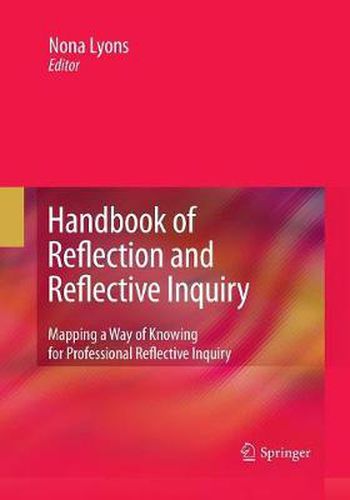Readings Newsletter
Become a Readings Member to make your shopping experience even easier.
Sign in or sign up for free!
You’re not far away from qualifying for FREE standard shipping within Australia
You’ve qualified for FREE standard shipping within Australia
The cart is loading…






This title is printed to order. This book may have been self-published. If so, we cannot guarantee the quality of the content. In the main most books will have gone through the editing process however some may not. We therefore suggest that you be aware of this before ordering this book. If in doubt check either the author or publisher’s details as we are unable to accept any returns unless they are faulty. Please contact us if you have any questions.
Philosophers have warned of the perils of a life spent without reflection, but what constitutes reflective inquiry - and why it’s necessary in our lives - can be an elusive concept. Synthesizing ideas from minds as diverse as John Dewey and Paulo Freire, theHandbook of Reflection and Reflective Inquiry presents reflective thought in its most vital aspects, not as a fanciful or nostalgic exercise, but as a powerful means of seeing familiar events anew, encouraging critical thinking and crucial insight, teaching and learning. In its opening pages, two seasoned educators, Maxine Greene and Lee Shulman, discuss reflective inquiry as a form of active attention (Thoreau’s wide-awakeness ), an act of consciousness, and a process by which people can understand themselves, their work (particularly in the form of life projects), and others. Building on this foundation, the Handbook analyzes through the work of 40 internationally oriented authors: - Definitional issues concerning reflection, what it is and is not; - Worldwide social and moral conditions contributing to the growing interest in reflective inquiry in professional education; - Reflection as promoted across professional educational domains, including K-12 education, teacher education, occupational therapy, and the law; - Methods of facilitating and scaffolding reflective engagement; - Current pedagogical and research practices in reflection; - Approaches to assessing reflective inquiry.
Educators across the professions as well as adult educators, counselors and psychologists, and curriculum developers concerned with adult learning will find the Handbook of Reflection and Reflective Inquiry an invaluable teaching tool for challenging times.
$9.00 standard shipping within Australia
FREE standard shipping within Australia for orders over $100.00
Express & International shipping calculated at checkout
This title is printed to order. This book may have been self-published. If so, we cannot guarantee the quality of the content. In the main most books will have gone through the editing process however some may not. We therefore suggest that you be aware of this before ordering this book. If in doubt check either the author or publisher’s details as we are unable to accept any returns unless they are faulty. Please contact us if you have any questions.
Philosophers have warned of the perils of a life spent without reflection, but what constitutes reflective inquiry - and why it’s necessary in our lives - can be an elusive concept. Synthesizing ideas from minds as diverse as John Dewey and Paulo Freire, theHandbook of Reflection and Reflective Inquiry presents reflective thought in its most vital aspects, not as a fanciful or nostalgic exercise, but as a powerful means of seeing familiar events anew, encouraging critical thinking and crucial insight, teaching and learning. In its opening pages, two seasoned educators, Maxine Greene and Lee Shulman, discuss reflective inquiry as a form of active attention (Thoreau’s wide-awakeness ), an act of consciousness, and a process by which people can understand themselves, their work (particularly in the form of life projects), and others. Building on this foundation, the Handbook analyzes through the work of 40 internationally oriented authors: - Definitional issues concerning reflection, what it is and is not; - Worldwide social and moral conditions contributing to the growing interest in reflective inquiry in professional education; - Reflection as promoted across professional educational domains, including K-12 education, teacher education, occupational therapy, and the law; - Methods of facilitating and scaffolding reflective engagement; - Current pedagogical and research practices in reflection; - Approaches to assessing reflective inquiry.
Educators across the professions as well as adult educators, counselors and psychologists, and curriculum developers concerned with adult learning will find the Handbook of Reflection and Reflective Inquiry an invaluable teaching tool for challenging times.